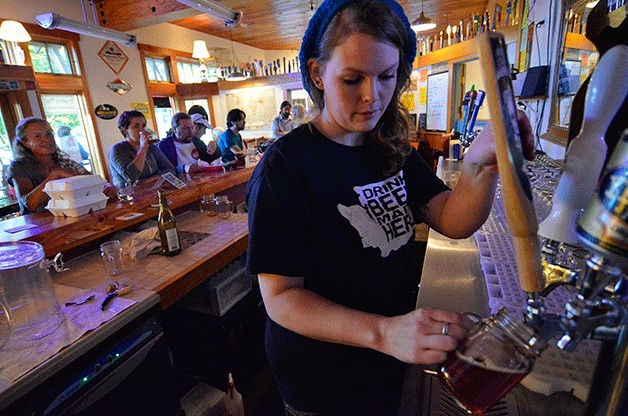Like many young aspiring business owners, South Whidbey residents Tiffany and Damien Cortez had a vision.
They saw a place that offered good beer, good wine and good times to a nightlife-starved South Whidbey. They had the plan and the energy to pull it off but were short on pennies.
In today’s economy, that’s where most good ideas end, and it appeared the Cortezes would be no exception. Lacking the right credit history, bank lenders took one look and said, “no way.”
“I had good credit, but not varied credit, so they wouldn’t give me a loan,” Tiffany Cortez said.
But with WILL, Whidbey Island Local Lending, they found a way.
A quiet and relatively new community-backed financing program, WILL offers islanders with insufficient or poor credit history a chance to secure low-interest loans.
Lacking most of the requirements and hurdles common with banks, lending can be accomplished quickly and is contingent more on a great idea and a solid business plan than insufficient credit history.
“They didn’t look at any of that,” Damien Cortez said. “They looked at our business plan and whether we’d make it or not.”
The Cortezes applied, and within a few weeks had secured a two-year, 4-percent interest $25,000 loan. Tiffany would be the legal owner, Damien the manager, and a short time after that, the couple’s dream, Taproom@Bayview Corner, brewed into reality.
“We opened to wall-to-wall people and a line that went out the door,” Damien Cortez said.
WILL was organized in 2012 and is not a financial institution, explained Steve Shapiro, a retired South Whidbey doctor and businessman.
“It’s not even an entity.”
The name is largely just something to call, “The quote, ‘members of WILL,’” Shapiro said.
There’s no board of directors, no president to call the shots. As spokesman for WILL, Shapiro himself has perhaps the most formal position of all. Summed up, the organization is composed of about 40 local investors, people with extra money who are looking for alternatives to traditional investments, such as CDs, stocks or bonds.
Lending with WILL is more easily accomplished than with traditional lenders, but Shapiro made it clear the money isn’t free.
“These are loans, not grants,” he said. “It’s not charity.
“We expect to get paid back.”
Shapiro is an investor who has made several loans, including part of the one the Cortezes received. One of the only legal requirements is that lenders and borrowers know each other.
In this case, Shapiro said he has known Damien Cortez all his life — he delivered him.
Existing relationships needn’t be so extensive, however, and most aren’t. The requirement can be achieved with a simple meeting, often accomplished at WILL gatherings, called Mashups. There, people looking for funding can make acquaintances and presentations to potential investors.
If the hopeful gets a bite, the rest of the details are hammered out privately among the involved parties.
To find out about the next mashup or to inquire about loans, email Shapiro at shapiro@whidbey.com
While not an original idea, WILL is the brainchild of Lynn Willeford, owner of the Clyde Theater.
She had kicked around the idea for a few years, but it got roots following her attendance of a conference focused on the Local Investment Opportunities Network, or LION, in Port Townsend.
So far, the group has received 50 requests for information, sent out 35 applications, 26 of them completed — six were denied and three withdrawn — and 17 approved.
In all, $642,700 in funding has been awarded — amounts ranged from $300 to $145,000 — with four loans already paid off.
Ron Nelson, executive director of the Island County Economic Development Council, describes WILL as a legitimate and successful alternative to traditional lending options and those with little, poor or no credit history.
Banks often want to give loans but are constrained by internal rules or policies initiated following the real estate market crash and recession. Knowing their limitations, he said, some loan officers are referring denied or ineligible customers to WILL.
It’s a program that has the power to make a big difference in Whidbey’s economy, giving start-ups a chance to succeed, Nelson said, but it’s also a success story in non-government related assistance.
“One of the things I really like about WILL is it’s the community taking care of the community,” Island County Commissioner Helen Price Johnson said.
Damien Cortez said the Taproom owes its existence to WILL. It made the necessary lending possible, but is also a source of inspiration for the couple. They hope to one day transition from borrower to lender.
“We’re just super grateful,” he said. “This kind of stuff is why we chose to stay on Whidbey.”
Tiffany Cortez agreed, calling WILL an unexpected opportunity that became a “Godsend.” Lending was accomplished in a month, and investors helped them develop a better business plan and really wanted to help. Simply, it’s something every community needs, she said.
“They really support local business; they give us all a chance,” she said.



